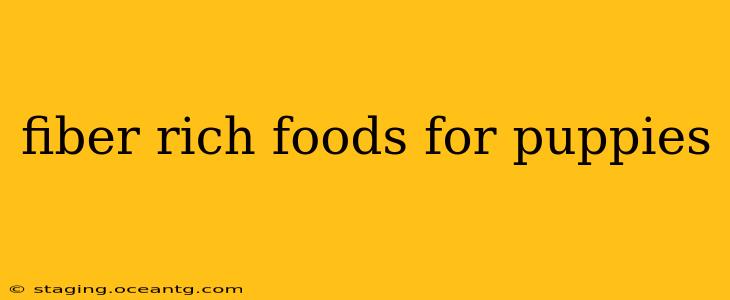Choosing the right food for your puppy is crucial for their overall health and development. While protein and fat are essential for growth, fiber plays a vital role in supporting healthy digestion and preventing common puppy problems like diarrhea and constipation. This guide explores fiber-rich foods suitable for puppies, emphasizing the importance of moderation and consulting your veterinarian before making significant dietary changes.
What are the Benefits of Fiber for Puppies?
Fiber, the indigestible part of plant-based foods, is essential for a puppy's gut health. It acts as a prebiotic, feeding beneficial bacteria in the gut, which in turn aids digestion, nutrient absorption, and strengthens the immune system. Sufficient fiber promotes regular bowel movements, preventing both constipation (hard stools) and diarrhea (loose stools). Furthermore, fiber can help regulate blood sugar levels and even contribute to a feeling of fullness, which can be helpful for puppies prone to overeating.
What Types of Fiber are Best for Puppies?
Not all fiber is created equal. Soluble fiber dissolves in water, forming a gel-like substance that helps slow down digestion and regulate blood sugar. Insoluble fiber, on the other hand, adds bulk to the stool, promoting regularity. A balanced mix of both types is ideal for puppies.
What Fiber-Rich Foods Can I Feed My Puppy?
While commercial puppy food usually contains adequate fiber, incorporating small amounts of fiber-rich foods as treats or supplements can be beneficial, always with your veterinarian's approval. Remember, moderation is key; too much fiber can cause digestive upset.
Safe Fiber-Rich Options (in moderation):
- Sweet Potatoes (cooked): Rich in both soluble and insoluble fiber, as well as vitamins and antioxidants. Always cook them thoroughly before offering them to your puppy.
- Pumpkin (canned, plain): Excellent source of fiber and vitamins. Make sure it's 100% pumpkin puree, not pumpkin pie filling.
- Green Beans (cooked): Low in calories and a good source of fiber. Steam or boil them until tender.
- Carrots (cooked or raw, small pieces): Contain fiber and beta-carotene, a precursor to Vitamin A. Raw carrots should be offered in small pieces to prevent choking hazards.
- Broccoli (cooked, small florets): Offers fiber and nutrients, but should be given in small quantities as it can cause gas in some dogs.
- Apples (without core and seeds): Provide fiber and vitamins, but remove the core and seeds, as they contain harmful substances.
Foods to Avoid:
Many human foods are toxic to dogs, so it's crucial to only offer safe options. Avoid feeding your puppy:
- Onions and Garlic: Toxic to dogs.
- Grapes and Raisins: Toxic to dogs.
- Chocolate: Toxic to dogs.
- Avocado: Contains persin, which can be toxic to dogs.
- Xylitol (artificial sweetener): Extremely toxic to dogs.
How Much Fiber Should My Puppy Eat?
The appropriate amount of fiber for your puppy will depend on their age, breed, size, and activity level. A veterinarian or veterinary nutritionist can provide personalized recommendations based on your puppy's specific needs. Never drastically change your puppy's diet without consulting your vet first. Gradual introduction of new foods is always best.
My Puppy Has Diarrhea/Constipation. Should I Give Them More Fiber?
While fiber is generally beneficial, it's crucial to consult your veterinarian if your puppy experiences persistent diarrhea or constipation. These symptoms could indicate an underlying health problem requiring professional attention. Adding more fiber without veterinary guidance may worsen the situation.
Can I Use Fiber Supplements for My Puppy?
Fiber supplements are available, but they should only be given under veterinary supervision. Your vet can help you determine the appropriate type and amount based on your puppy’s specific needs.
Conclusion
Adding small amounts of fiber-rich foods to your puppy's diet can be beneficial for their digestive health. However, always consult with your veterinarian before making any dietary changes. They can assess your puppy's individual needs and guide you in selecting the right foods and quantities to ensure optimal gut health and overall well-being. Remember, moderation is key, and a balanced diet tailored to your puppy's age and breed is paramount.
